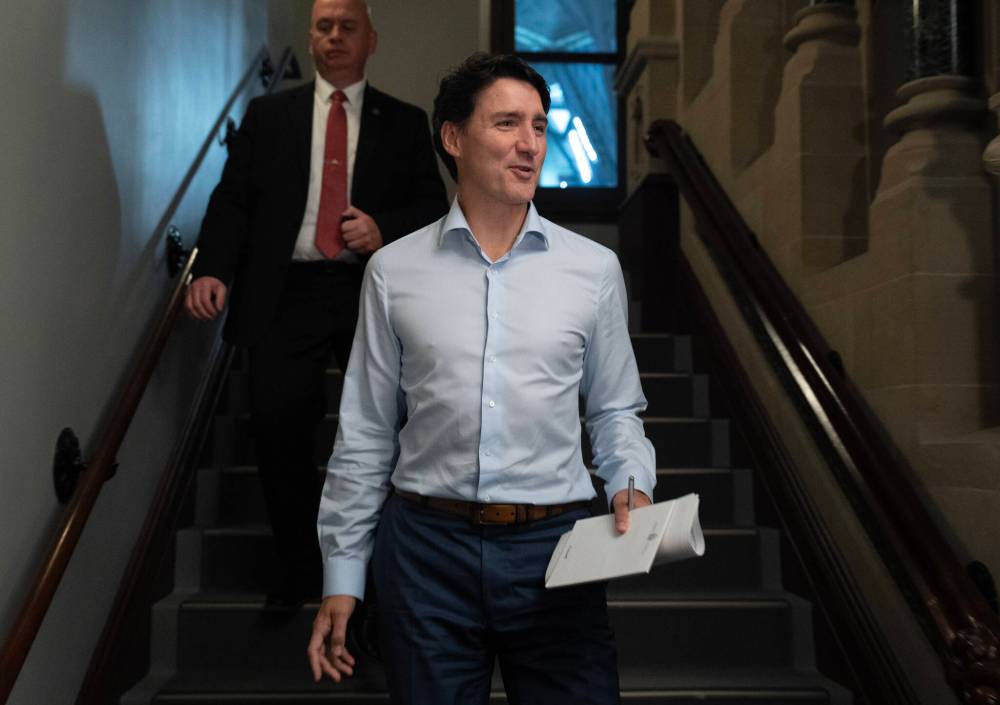Living with the perpetual ‘or else’ of ultimatums
Advertisement
Read this article for free:
or
Already have an account? Log in here »
To continue reading, please subscribe:
Monthly Digital Subscription
$1 per week for 24 weeks*
- Enjoy unlimited reading on winnipegfreepress.com
- Read the E-Edition, our digital replica newspaper
- Access News Break, our award-winning app
- Play interactive puzzles
*Billed as $4.00 plus GST every four weeks. After 24 weeks, price increases to the regular rate of $19.00 plus GST every four weeks. Offer available to new and qualified returning subscribers only. Cancel any time.
Monthly Digital Subscription
$4.75/week*
- Enjoy unlimited reading on winnipegfreepress.com
- Read the E-Edition, our digital replica newspaper
- Access News Break, our award-winning app
- Play interactive puzzles
*Billed as $19 plus GST every four weeks. Cancel any time.
To continue reading, please subscribe:
Add Winnipeg Free Press access to your Brandon Sun subscription for only
$1 for the first 4 weeks*
*$1 will be added to your next bill. After your 4 weeks access is complete your rate will increase by $0.00 a X percent off the regular rate.
Read unlimited articles for free today:
or
Already have an account? Log in here »
Hey there, time traveller!
This article was published 26/10/2024 (335 days ago), so information in it may no longer be current.
Ultimatums are a poor way to do business. Or politics.
No matter what happens, whether you give in to them or you stand firm, you can’t help but feel you’ve been threatened.
To be clear, an ultimatum is not a deadline. A deadline is just a matter of setting timing. An ultimatum is when you add the words “or else” to the mix.

Adrian Wyld / The Canadian Press
Prime Minister Justin Trudeau.
And Prime Minister Justin Trudeau is dealing with not just one ultimatum, but two.
The first is from the Bloc Québécois: the Bloc has demanded the Liberals support two Bloc motions in Parliament. One is a bill that would increase Old Age Security payments to those between the ages of 65 and 74 by 10 per cent. (Those over 75 have already seen a 10 per cent increase.) Over the next five years, the move would cost Canadian taxpayers $16.1 billion.
As well, the Bloc wants the Liberals to back a bill protecting the Canadian supply-management system in future international trade deals.
There’s a deadline, and an “or else”: pass the bills on Oct. 29, or lose the Bloc’s support on a future vote of non-confidence in the Trudeau government, a move that would bring on a federal election.
The federal Conservatives are salivating at the possibility: they’re eager enough for a quick election that they’ve backed the Bloc’s bill, even though the concept seems to conflict with Conservative Leader Pierre Poilievre’s plan to halt future government spending.
Poilievre, it must be remembered, has touted a “Cap the spending with a dollar-for-dollar rule to bring down interest rates and inflation. The government must find a dollar in savings for every new dollar of spending.”
By that metric, having his party support a $16.1-billion spending increase should come with some idea about where it expects that money might be coming from.
But hey — it’s all politics, which means it can change with the weather.
Now, to the second ultimatum.
And this one’s coming from inside the house — or, at least, from inside the Liberal caucus.
The Liberal caucus met on Wednesday to discuss Trudeau’s plummeting political fortunes, with a block of MPs signing a letter saying Trudeau had to decide whether he was staying as prime minister or stepping down — and giving him until Oct. 28 to decide.
In this case, the “or else” is a read-between-the-lines message. The MPs who supported the letter didn’t directly explain what would happen if their deadline wasn’t met, but the implications are pretty darned clear: instead of just fighting with opposition parties, Trudeau would be battling a fractious backbench — and maybe some cabinet ministers as well.
It’s a mess, and it can’t last long.
The politics of appeasement just don’t work in the long term — if, as a government, you’re desperate to keep opposition parties (and potentially even your own MPs) onside, you end up having to accept ever-increasing demands. Your ability to do anything like prudent issue management or even cost control decreases by the day — you’re no longer just answerable to the people of the country, you’re answerable to opponents who, in the end, want to see you be defeated.
It’s not compromise — it’s being compelled.
Can a government survive being at the beck and call of a rotating cast of opposition parties, endlessly currying to ever-growing demands? Maybe. For a while. A very little while.
But the end result is that the Liberals’ own agenda and policies will disappear behind the pile-on of pet projects demanded not only by the opposition, but potentially by individual Liberal MPs as well.
Oh, and one more thing about ultimatums.
Every time you give in to one, another one is likely to arrive.



